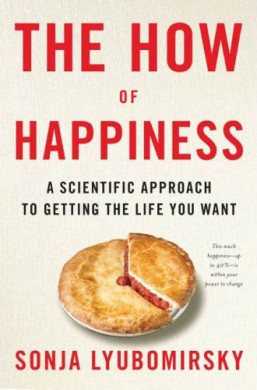Sonja is a Professor at the University of California and has spent many years studying happiness. The video above is an excerpt from a talk Sonja gave at the Greater Good Science Center.
In it she outlines some of the key findings from her research. You can discover more about her via the following link.
The How of Happiness
So how do people become happy? And how can they maintain happiness?
Sonja and her team of researchers say that our happiness is influenced by the following factors.
50% is influenced by our Character – our Genes.
10% is influenced by our Circumstances.
40% is within our Control.
Writing on her official site, Sonja says:
“My empirical findings over the years have revealed that chronically happy and unhappy individuals differ systematically and in a manner supportive of their differing temperaments in the particular cognitive and motivational strategies they use.
“For example, my students and I have found that truly happy individuals construe life events and daily situations in ways that seem to maintain their happiness, while unhappy individuals construe experiences in ways that seem to reinforce unhappiness.
“In essence, our research shows that happy individuals experience and react to events and circumstances in relatively more positive and more adaptive ways.”
The Benefits of Happiness
Sonja asks if being happy simply leads to feeling good or does it have other benefits? She and her students have found it has many benefits for individuals, families, communities and the wider society. These include:
Higher income and superior work outcomes. For example, greater productivity and higher quality of work.
Larger social rewards. For example, satisfying and longer marriages, more friends, stronger social support and richer social interactions.
More activity, energy, and flow, and better physical health. For example, a bolstered immune system, lowered stress levels, and less pain. It can also lead to a longer life.
She adds:
“The literature, my colleagues and I have found, also suggests that happy individuals are more creative, helpful, charitable, and self-confident, have better self-control, and show greater self-regulatory and coping abilities.”
How To Increase Happiness
Sonja is frequently asked how people can increase their happiness. She often answers by saying that she is a scientist and tends to avoid self help books.
Nevertheless, she says, the research seems to show that some of the advice that Grandma gave may well be true. These include some of the following activities.
Gratitude.
Regularly setting aside time to count one’s blessings. Other researcher’s studies of individuals who set aside half an hour a day to count their blessings show that such people increase and maintain their happiness.
Kindness.
Being kind to others. The act of giving to others creates a good feeling in both oneself and, hopefully, in others. This creates a positive circle in one’s life.
Positive Attitude.
Developing positive scripts. Reflecting on positive experiences, recalling times of overcoming difficulties, talking to oneself in a positive way regarding future opportunities.
Sonja and her students are also looking at the following themes regarding increasing one’s happiness.
Life Goals.
Listing and taking action on ‘baby steps’ towards these goals.
Forgiveness.
Forgiving people in one’s life, but not at the expense of becoming a victim.
Savouring Positive Experiences.
Such as using one’s five senses to relish daily moments.
Using one’s Signature Strengths in New Ways.
Continuing to develop doing the things one does best.
Here is another excerpt from Sonja’s talk at the Greater Good Science Center. In it she describes some of the ways that people can increase their happiness.
You can discover more about the Center’s work via the following link.







Leave a Reply